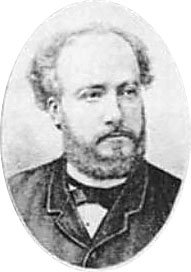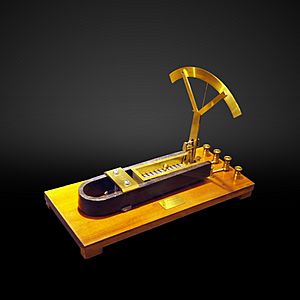Marcel Deprez facts for kids
Quick facts for kids
Marcel Deprez
|
|
|---|---|
 |
|
| Born | 12 December 1843 Aillant-sur-Milleron, Loiret, France
|
| Died | 13 October 1918 (aged 74) Vincennes, Val-de-Marne, France
|
| Nationality | French |
| Known for | HVDC electricity distribution |
| Awards | Awarded membership, French Academy of Sciences |
Marcel Deprez (born December 12, 1843 – died October 13, 1918) was a clever French electrical engineer. He was born in a small town called Aillant-sur-Milleron in France. He later passed away in Vincennes. Deprez is famous for his important work in sending electricity over long distances.
Contents
Early Life and Work
Marcel Deprez grew up in the French countryside. He went to the School of Mines in Paris, which was a very good school. Even though he didn't finish his studies there, he made a great impression. He ended up working as a secretary for the school's director, Charles Combes. This early experience helped him learn a lot about science and engineering.
Sending Electricity Far Away
Before Marcel Deprez, electricity could only travel short distances. This meant that power plants had to be very close to homes and factories. Deprez wanted to change this. He dreamed of a way to send electricity much farther.
From 1876 to 1886, Deprez did many experiments in a place called Creil. He was trying to figure out how to transmit electrical power over long distances. This was a huge challenge at the time.
In 1881, there was a big event in Paris called the International Exposition of Electricity. Deprez showed off his ideas for an electricity distribution system. His system was based on sending direct current (DC) electricity over long wires. Direct current means the electricity flows in only one direction.
The Big Success in Germany
Deprez's most famous success happened in 1882. This was during an Electricity Exposition in Munich, Germany. He managed to send electricity from a town called Miesbach all the way to Munich. This was a distance of about 35 miles (56 kilometers)!
He sent 1.5 kilowatts (kW) of power at 2,000 volts (2 kV). This was a huge step forward. It proved that electricity could be sent far away. This meant power plants could be built further from cities. It also meant more people could get electricity.
Continuing Experiments and Legacy
After his success in Germany, Deprez kept working. He did more experiments in places like La Chapelle, Grenoble, and Paris. He kept improving his methods for sending electricity over long distances for industrial use.
His work was very important for the future of electricity. Other engineers, like René Thury, built on Deprez's ideas. Thury later developed even bigger systems. These systems could deliver huge amounts of power over hundreds of kilometers. Marcel Deprez's pioneering work helped make it possible for us to have electricity in our homes and schools today.

See also
 In Spanish: Marcel Deprez para niños
In Spanish: Marcel Deprez para niños
 | Jackie Robinson |
 | Jack Johnson |
 | Althea Gibson |
 | Arthur Ashe |
 | Muhammad Ali |

